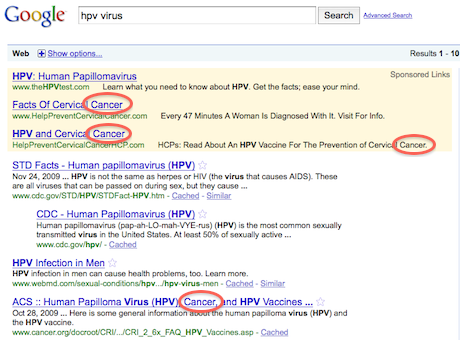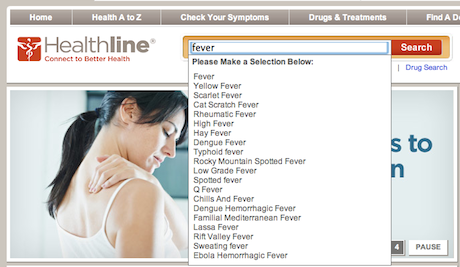Healthline Raises $14 Million to Grow Medical Search Engine
A few weeks ago, I got a chance to speak to Dean Stephens, President & COO of Healthline, about their semantic search engine. Today, Healthline announced that it has raised another $14 million in a third round of financing led by Investor Growth Capital (IGC) and including strategic financing from a joint venture between GE Capital’s Media, Communications & Entertainment business and NBC Universal and Reed Elsevier Ventures.
In collaboration with doctors, Healthline have built a semantic search engine that uses professional medical terminology and taxonomies to organize all the data into a consumer friendly package. Their vision is to connect consumers to anything in the health information space that is publicly available.
The idea for a semantic search index came from physicians’ observations that despite a noble trend towards consumers trying to educate themselves in healthcare via the internet, many found that ‘contextual correctness’ was missing. This led consumers to jump to wrong, and often unnecessarily sinister, conclusions. In turn, this led consumers to demand inappropriate medical treatment. Put another way, despite an information revolution, hypochondria and PageRank still don’t play nice together.
“Warts-n-all” analysis of how semantic data improves search engine results pages (SERPs) for medical queries
According to Healthline, 75% of medical searches start with symptoms. Yet a quick search on Google shows how easy it is for good intentions go awry. A single search for a typical sympton of Warts, namely ‘cauliflower skin growth’, only takes 3 results before, alarmingly, the Big C Word is mentioned.

Whilst, strictly speaking, there may be a link to cancer or venereal disease, under the majority of circumstances Warts are harmless (but infectious) skin lesions caused by the HPV virus. However, if you were to follow the strongest cues from the results, a further investigation of HPV virus is likely to cause you to push the panic button.

All rivers don’t lead to the sea
Google is not doing a bad job in any of the cases above. It’s simply surfacing the entire relevant knowledge base around that symptom and ranking it according to citation (that’s just what PageRank does). Inevitably this means that more serious conditions rise to the top – as those topics are naturally going to be the ones that are most talked about and interlinked between different websites. Consequently, it would be somewhat fair to say that ‘no news is good news’ when it comes to symptom search on Google.
To the untrained eye looking at the SERPs, the lack of structured data, gives the false impression that warts lead to cancer as inevitably as a river leads to the sea. However, to the expert eye, this is clearly not the full story. Just as a geography teacher might correct your facts, to explain that actually most rivers break off into tributaries which then form a delta before reaching the sea (and some even flow into lakes and reservoirs or evaporate before reaching the sea); so too, a trained physician percieves any symptom as sitting within a complex matrix of cases and furthermore each symptom sits within a graded heirarchy of severity.
For instance the symptom ‘Fever’ can be broken down into or High or Low grades:

Which could then correspond to 20 different types of Fever:

Healthline’s latest offering Symptom Search displays a completely new model of SERPs that is strikingly informative. It positions your query within a set of possible medical cases, which themselves are nested within a set of corresponding symptoms – creating a decision tree of research cues or action points. Compare the results below on symptom search with Google’s aformentioned result set. What becomes quite clear is that, in all cases, further investigation is required, yet a sense of severity and importance is provided by the results sitting within a greater and broader context. The research path seems to lead out of the rabbit hole.

How does a medical search engine make money?
Healthline have a diversified revenue model which is 60% ad supported and 30% from platform licensing. These revenues come from four business lines, namely healthline.com, the media network, their technology partner network and a lead generation program. Ad sales are conducted directly or through their media network which includes AARP, ABCNews.com, Aetna, AOL, Elsevier, GE, Health.com, Ingenix, iVillage, Medhelp, United Health Group, U.S. News and World Report. Platform licensing costs pay for the platform and any professional fees or design customisations. Yahoo Health recently teamed up with Healthline and the company also powers Ask.com’s smart answers for health queries.

Is there a future in medical search?
Doctors and hospitals have a pressing need to reach the right patients and reduce the costs of effective treatment. They are looking for engaged consumers, because the theory goes that the more educated the consumer, the more effective they are in using healthcare resources. Efficiency should mean they get the right treatment the first time round.
Coupled with these market conditions is Obama’s new patient centric healthcare legislation, which effectively forces large healthcare providers and doctors to provide better information to patients. The concept of ‘meaningful use’ is a staple part of the bill and guides new medical technology purchases, ultimately means all investments have to ‘provide value to the patient’. Stephens argues that essentially Obama’s new healthcare plan has incentivized the entire industry to start providing better public information and consequently created a huge opportunity for search technology. Rather than investing in physician portals, spending is moving towards patient portals where consumers can facilitate their own recovery. In essence, healthcare providers are now heavily investing in the means to better serve their customers’s customers.
Healthline are hopeful that their semantic search platform will be the eco-system or application layer that other companies choose to build their own health services upon.